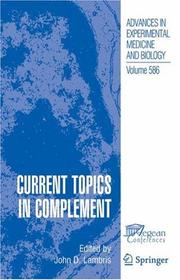| Listing 1 - 2 of 2 |
Sort by
|

ISBN: 1280744898 9786610744893 038734134X 0387322310 1461498015 Year: 2006 Publisher: New York, NY : Springer US : Imprint: Springer,
Abstract | Keywords | Export | Availability | Bookmark
 Loading...
Loading...Choose an application
- Reference Manager
- EndNote
- RefWorks (Direct export to RefWorks)
Complement has long been regarded as a pivotal effector arm of the innate im-mune response, eliciting important immunoregulatory functions in the context of inflammation and also serving as a vital link between the innate and adaptive immune response. In the post-genomic era, our knowledge of the innate immune system is enriched by findings that point to novel functions that do not strictly correlate with immunological defense and surveillance, immune modulation or inflammation. Several studies indicate that complement proteins exert functions that are either more complex than previously thought, or go well beyond the innate immune character of the system. The advent of high-throughput platforms for genome and proteome-wide profiling, together with the enormous amount of raw genetic information that has accumulated in the databases, have stirred new expectations in biomedical research. They have led complementologists to revisit established biological systems, such as the complement system, from a global and integrative perspec-tive. Complement research is now faced with the challenge of trying to integrate isolated biochemical pathways into complex gene and protein regulatory cir-cuits. In this respect, scientists from around the world convened at the Third Aegean Conferences Workshop on Complement Associated Diseases, Animal Models, and Therapeutics (June 5–10, 2005), to discuss recent advances in this fast evolving field. This volume represents a collection of topics on the "novel" functions of complement, pathophysiology, protein structures, design of complement inhibitors, and complement assays discussed during the conference.
Complement (Immunology) --- Blood proteins. --- Plasma proteins --- Serum proteins --- Blood plasma --- Proteins --- Serum --- Alexin --- Complements (Immunity) --- Blood proteins --- Immunology. --- Microbiology. --- Emerging infectious diseases. --- Pathology. --- Infectious Diseases. --- Disease (Pathology) --- Medical sciences --- Diseases --- Medicine --- Medicine, Preventive --- Emerging infections --- New infectious diseases --- Re-emerging infectious diseases --- Reemerging infectious diseases --- Communicable diseases --- Microbial biology --- Biology --- Microorganisms --- Immunobiology --- Life sciences --- Serology --- Infectious diseases.
Book
ISBN: 9780387789521 0387789510 9780387789514 1441927069 9786612287770 128228777X 0387789529 Year: 2008 Publisher: New York, NY : Springer New York : Imprint: Springer,
Abstract | Keywords | Export | Availability | Bookmark
 Loading...
Loading...Choose an application
- Reference Manager
- EndNote
- RefWorks (Direct export to RefWorks)
Complement has long been regarded as a pivotal effector arm of the innate immune response, eliciting important immunoregulatory functions in the context of inflammation and also serving as a vital link between the innate and adaptive immune response. In the post-genomic era, our knowledge of the innate immune system is enriched by findings that point to novel functions that do not strictly correlate with immunological defense and surveillance, immune modulation or Inflammation. Several studies indicate that complement proteins exert functions that are either more complex than previously thought, or go well beyond the innate immune character of the system. The advent of high-throughput platforms for genome and proteome-wide profiling, together with the enormous amount of raw genetic information that has accumulated in the databases, have stirred new expectations in biomedical research. They have led complementologists to revisit established biological systems, such as the complement system, from a global and integrative perspective. Complement research is now faced with the challenge of trying to integrate isolated biochemical pathways into complex gene and protein regulatory circuits. In this respect, scientists from around the world convened at the Fourth Aegean Conferences Workshop on Complement Associated Diseases, Animal Models, and Therapeutics (June 10-15, 2007), to discuss recent advances in this fast evolving field. This volume represents a collection of topics on the “novel” functions of complement, patho-physiology, protein structures, design of complement inhibitors, and complement assays discussed during the conference.
Biomedicine. --- Immunology. --- Microbiology. --- Infectious Diseases. --- Pathology. --- Medicine. --- Emerging infectious diseases. --- Médecine --- Immunologie --- Maladies infectieuses émergentes --- Pathologie --- Microbiologie --- Complement (Immunology) -- Congresses. --- Complement (Immunology). --- Complement (Immunology) --- Immunoproteins --- Immune System Processes --- Publication Formats --- Blood Proteins --- Publication Characteristics --- Immune System Phenomena --- Proteins --- Phenomena and Processes --- Amino Acids, Peptides, and Proteins --- Chemicals and Drugs --- Complement System Proteins --- Congresses --- Complement Activation --- Medicine --- Biology --- Health & Biological Sciences --- Medical Research --- Microbiology & Immunology --- Natural immunity --- Disease resistance --- Host resistance --- Innate immunity --- Innate resistance --- Native immunity --- Natural resistance --- Nonspecific immunity --- Resistance to disease --- Alexin --- Complements (Immunity) --- Infectious diseases. --- Microbial biology --- Microorganisms --- Disease (Pathology) --- Medical sciences --- Diseases --- Medicine, Preventive --- Immunobiology --- Life sciences --- Serology --- Clinical sciences --- Medical profession --- Human biology --- Pathology --- Physicians --- Immunity --- Blood proteins --- Emerging infections --- New infectious diseases --- Re-emerging infectious diseases --- Reemerging infectious diseases --- Communicable diseases
| Listing 1 - 2 of 2 |
Sort by
|

 Search
Search Feedback
Feedback About
About Help
Help News
News